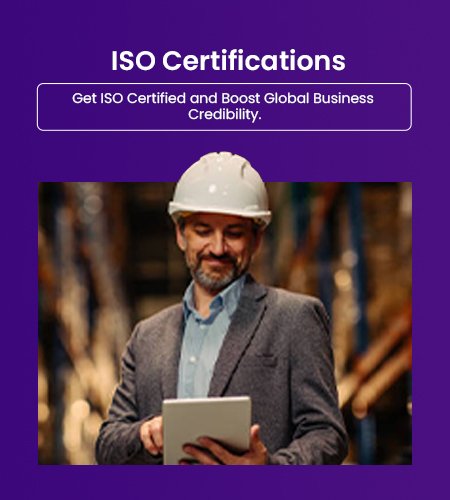
ISO Certification
- Globally recognized certification standard
- Mandatory for many export tenders
- Accredited by International bodies
- Higher trust and brand credibility
- Suitable for regulated industries
- Faster and cost-effective process
- Useful for internal quality improvement
- Accepted in informal business settings
- No global or tender eligibility assurance
- Ideal for early-stage businesses
Quality Management Standards
ISO Certification
Explore the different types of ISO certifications available
and their respective advantages and disadvantages.
ISO Certification -- IAF Accredited
An IAF-accredited ISO certification is issued by a certification body that is recognized by the International Accreditation Forum (IAF), which is the global authority for accreditation of ISO bodies. In India, these certifications are valued across industries and offer strong credibility nationally and internationally. Common standards include ISO 9001 (Quality Management), ISO 14001 (Environmental Management), and ISO 22000 (Food Safety Management). IAF-accredited certificates are globally accepted and often mandatory for government tenders, export orders, and corporate vendor registrations. These certificates are audited by accredited bodies and ensure compliance with globally recognized procedures, offering higher assurance to stakeholders regarding a company's quality and operational integrity.
Advantages
-
Globally AcceptedRecognized by international buyers and governments.
-
Enhances CredibilityBoosts reputation with clients, suppliers, and investors.
-
Eligible for Tenders & ContractsOften required in corporate/government RFPs.
-
Standardized ProcessesHelps streamline internal operations.
-
Supports Export BusinessAccepted by foreign regulatory bodies.
-
Competitive EdgeAdds weight in vendor selection processes.
-
Authorized by Accrediting BodyVerified on IAF Global Database.
Disadvantages
-
Higher Certification CostFees are higher due to international auditing.
-
Time-Consuming AuditsInvolves detailed checks and multiple stages.
-
Strict Surveillance AuditsSubject to annual reviews by auditors.
-
Requires DocumentationMust maintain process records and manuals.
-
Less Flexibility in ImplementationAdherence to global standards is mandatory.
-
Mandatory RenewalCertificates usually valid for 3 years, with annual audits.
-
Limited Certifying BodiesOnly a few bodies are IAF-accredited in India.
ISO Certification -- Non-IAF (Non-Accredited)
Non-IAF ISO certifications are issued by certifying bodies not recognized by the International Accreditation Forum (IAF). These certificates are often used for internal quality assurance, branding, and meeting private client requirements where formal accreditation isn't a strict necessity. While they follow similar documentation and process audit procedures, they are not globally or governmentally recognized, and cannot be used in official tenders or export validations. Many small businesses choose non-IAF ISO certifications due to lower cost and faster issuance, especially when certifications are used primarily for marketing or client reassurance in non-critical industries. However, these certificates lack formal credibility for high-level procurement or regulatory purposes.
Advantages
-
Cost-EffectiveMuch cheaper than IAF-accredited certifications.
-
Faster IssuanceProcess is quicker with minimal documentation.
-
Useful for MarketingEnhances brand image for small/local businesses.
-
Basic Process StandardizationStill helps define internal workflows.
-
No Annual AuditsLess regulatory pressure post-certification.
-
Flexible ImplementationNot bound by rigid global formats.
-
Entry-Level Quality MarkSuitable for startups with limited scope.
Disadvantages
-
Not Recognized in Tenders/ExportsLacks legal or international value.
-
Lower CredibilityPerceived as symbolic or promotional.
-
Not Verifiable on IAF DatabaseCannot be validated by global entities.
-
Not RegulatedNo oversight by accreditation authorities.
-
Rejection RiskMay be rejected in B2B registration or by informed clients.
-
No Legal StandingNot valid under statutory or corporate policy requirements.
-
Confusion for ClientsMay be mistaken as misleading by some stakeholders.
Comparison: IAF vs. Non-IAF ISO Certification
| Criteria | IAF ISO Certification | Non-IAF ISO Certification |
|---|---|---|
| Accrediting Authority | Recognized by the International Accreditation Forum (IAF) | Not recognized by IAF |
| Global & Government Acceptance | Accepted internationally and in government tenders | Not accepted for official tenders, exports, or vendor approvals |
| Cost | Higher due to strict compliance and accredited auditors | Lower; budget-friendly option for small businesses |
| Audit & Verification | Strict, multi-stage audit with annual surveillance | Basic audit or self-declared compliance; minimal verification |
| Purpose & Application | Used for tenders, exports, quality assurance in regulated sectors | Used for branding, internal use, or non-critical B2B transactions |
| Availability on IAF Database | Listed and verifiable on IAF Global Database | Not listed or verifiable via IAF |
| Market Perception | High trust and credibility among large clients and institutions | Viewed as symbolic; may raise concerns among informed clients |
© ROKADH FINANCIAL SERVICES PRIVATE LIMITED

